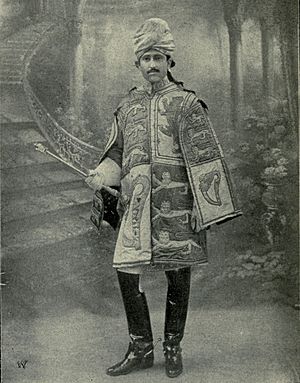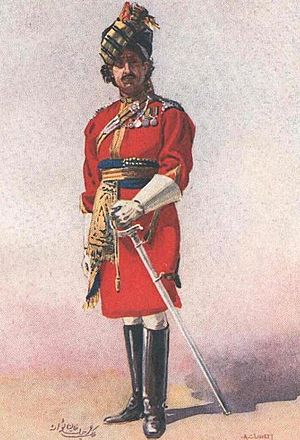Malik Umar Hayat Khan facts for kids
Quick facts for kids
Sir Umar Hayat Khan
|
|
|---|---|

Khan as Assistant Delhi Herald, 1911
|
|
| Born | 5 October 1874 Megha, Punjab, British India |
| Died | 24 March 1944 (aged 69) Sargodha, Punjab, British India |
| Allegiance | |
| Service/ |
|
| Rank | Major General |
| Unit | 18th King George's Own Lancers 19th King George's Own Lancers |
| Battles/wars | Somaliland War British expedition to Tibet World War I Third Anglo-Afghan War |
| Alma mater | Aitchison College |
Major General Nawab Sir Umar Hayat Khan Tiwana (born October 5, 1874 – died March 24, 1944) was an important figure in British India. He was a soldier, a very large landowner in the Punjab region, and a chosen member of the Council of State of India. This council helped make laws for the country.
Contents
Early Life and Family Background
Umar Hayat Khan was born in a place called Megha, in the Punjab. His father was Sir Malik Sahib Khan. His family, the Tiwanas, were a well-known Rajput family from Khushab.
He went to Aitchison Chiefs College in Lahore from 1888 to 1893. This was a special school for the sons of important families.
Military Career and Service
Umar Hayat Khan was a brave soldier. He fought in several wars and conflicts:
- The Somaliland War (1902–1904)
- The British expedition to Tibet (1903-1904)
- World War I (1914-1915) in Europe
- The Third Anglo-Afghan War
He was part of the 18th King George's Own Lancers and later the 19th King George's Own Lancers, which were cavalry units. He was mentioned in official reports for his bravery many times.
He also served as an honorary aide-de-camp (a personal assistant) to three British kings: George V, Edward VIII, and George VI.
Involvement in Public Life
Beyond his military service, Umar Hayat Khan was very active in public life.
- In 1907, he became an assistant to the ruler of Afghanistan, HM the Amir of Afghanistan.
- From 1910 to 1944, he was a member of the Governor-General of India's Imperial Council. This council advised the Governor-General, who was the highest British official in India.
- In 1910, he spoke in the Imperial legislature (a law-making body). He suggested that Europeans should oversee districts to protect everyone's interests.
Special Roles and Elections
- At the Delhi Durbar in 1911, a grand ceremony to celebrate the British King, Khan was an Assistant Herald. He helped with the official announcements.
- In 1913, he was chosen as one of the leaders of the All-India Muslim League. This was a political group that worked for the rights of Muslims in India.
- He helped make sure that former soldiers could vote in the Montagu–Chelmsford Reforms of 1919. These reforms gave Indians more say in their own government.
- He was a member of the Council of the Secretary of State for India from 1924 to 1934. This council advised the British government minister in charge of India.
- He was also an elected member of the Council of State and served two terms on the Punjab Legislative Council.
In 1924, a court document described him as a "Colonel" and a "Zamindar" (a large landowner) with a huge amount of land. He was also an "Honorary Magistrate," meaning he could act as a judge for minor cases.
Time Spent in London
From 1929 to 1934, Umar Hayat Khan lived mostly in London.
- He joined the Conservative Carlton Club, a famous private club.
- He became the President of the British Falconers' Club, showing his interest in falconry.
- He helped promote the career of Mir Sultan Khan, a very talented chess player from India. Even though Sultan Khan didn't know how to write down chess moves, he was good enough to play against top British and international players.
While in London, he lived at 10 Prince Albert Road and often hosted open houses on weekends. Choudhry Rahmat Ali, a student who later proposed the name "Pakistan," was a regular guest there. His famous "Now or Never" pamphlet, which called for a separate Muslim state, was partly written at Khan's home.
A Major Court Case
In 1924, Umar Hayat Khan was an important witness in a big court case in London. This case was called O'Dwyer v. Nair.
- Sir Michael O'Dwyer, a former British governor, sued Sir Chettur Sankaran Nair. The case was about events related to the Amritsar Massacre and other problems in Punjab in 1919.
- Khan testified that there were targets for recruiting soldiers from villages. He also mentioned incidents where villagers resisted recruitment.
- The case was one of the longest civil trials in English history at that time. O'Dwyer won the case.
Personal Life and Family
Umar Hayat Khan's son, Malik Khizar Hayat Tiwana, later became the last Premier (leader) of the Punjab.
Umar Hayat Khan had a strong belief that people from his family's lands should not work in government jobs. He wanted them to avoid acting like British rulers. This is why there were very few Hindus in Kalra state and few refugees came there during the partition of India.
Awards and Recognitions
Umar Hayat Khan received many honors for his service:
- Africa General Service Medal with clasp Jidballi (1903)
- Delhi Durbar Medal (1903 and 1911)
- Member of the Royal Victorian Order, Fourth class (MVO) (1911)
- Knight Commander of the Order of the Indian Empire (KCIE) (1916)
- The personal title of Nawab (1929)
- Knight Grand Cross of the Order of the British Empire (GBE) (1934)
- Honorary Magistrate (first class)
- President of the Falconers' Club
Military Promotions and Roles
He was promoted to honorary ranks in the Indian Army:
- Honorary Lieutenant (1901)
- Honorary Captain (1911)
- Honorary Major (1917)
- Honorary Lieutenant-Colonel (1920)
- Honorary Colonel (1930)
- Honorary Major General (1935)
- Honorary Colonel of the 18th King George's Own Lancers
He also served as an Honorary Extra Aide-de-camp to:
- George V (1930)
- Edward VIII (1935)
- George VI (1936 to 1944)
 | Jackie Robinson |
 | Jack Johnson |
 | Althea Gibson |
 | Arthur Ashe |
 | Muhammad Ali |


